外研版必修五Module 1 British and American English - Grammar课件(31张)
文档属性
| 名称 | 外研版必修五Module 1 British and American English - Grammar课件(31张) | 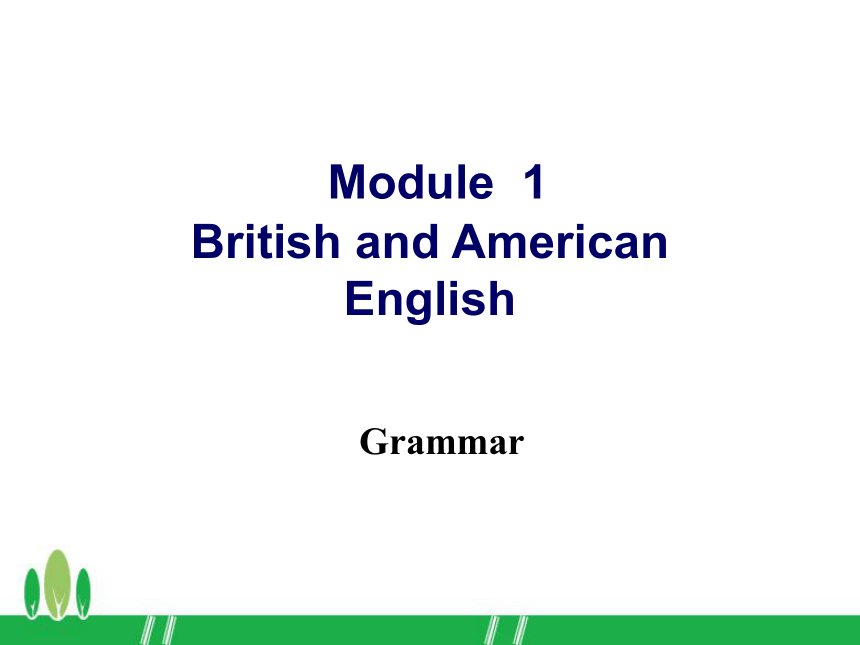 | |
| 格式 | zip | ||
| 文件大小 | 257.2KB | ||
| 资源类型 | 教案 | ||
| 版本资源 | 外研版 | ||
| 科目 | 英语 | ||
| 更新时间 | 2019-07-16 20:27:26 | ||
图片预览

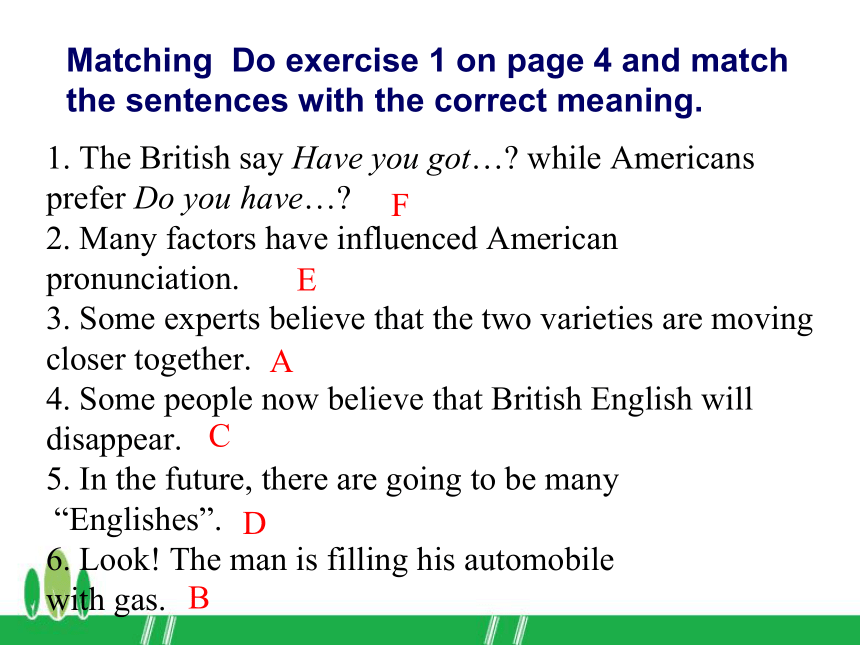
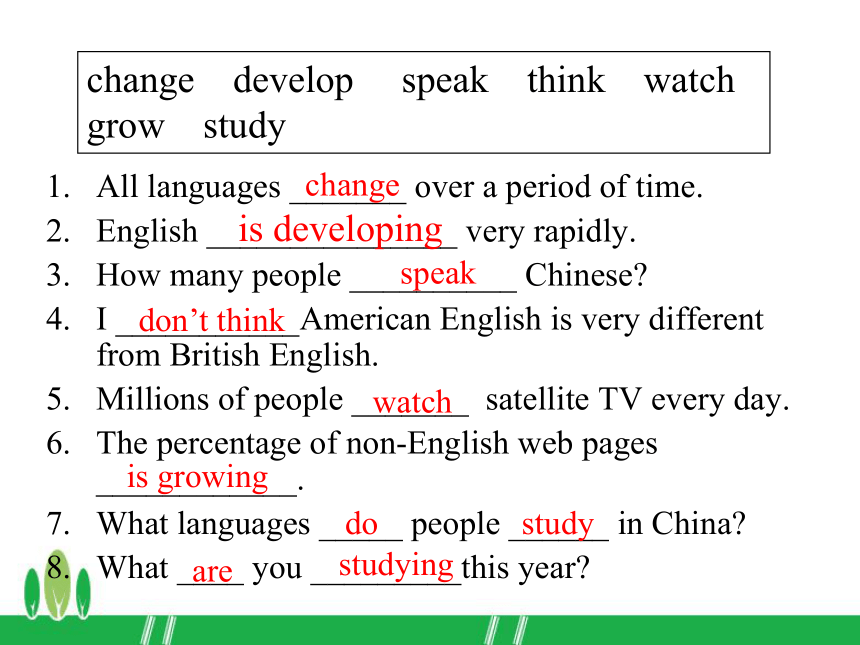
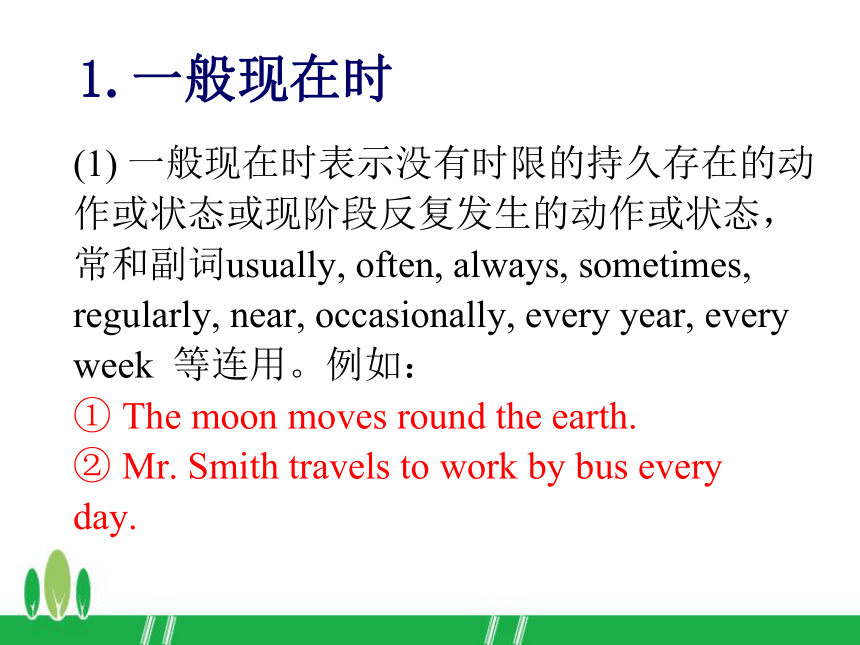
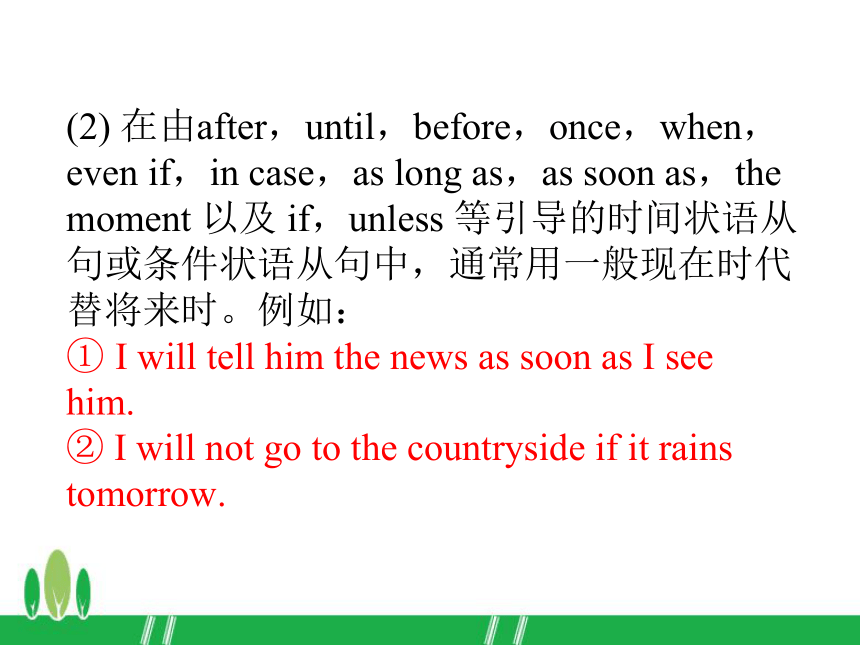
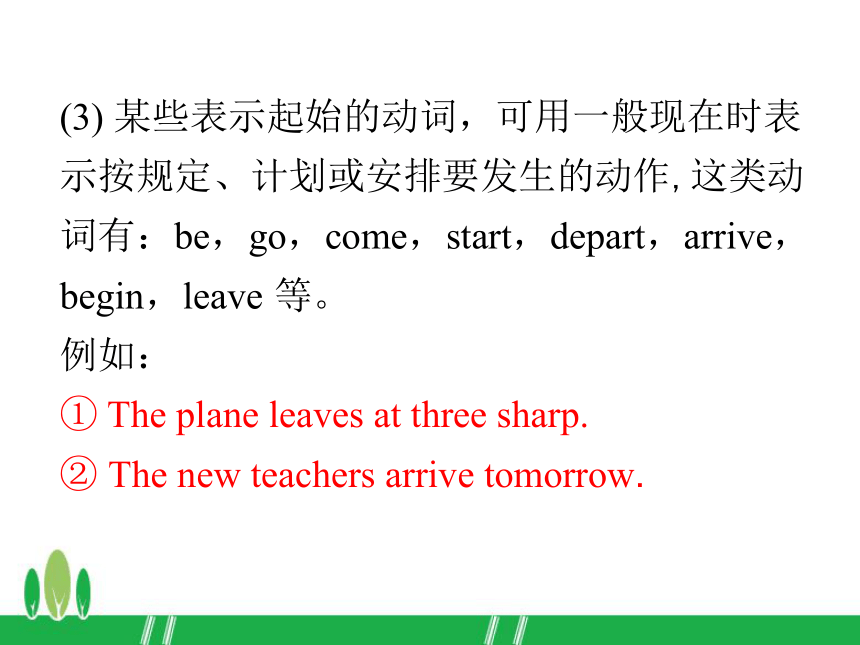
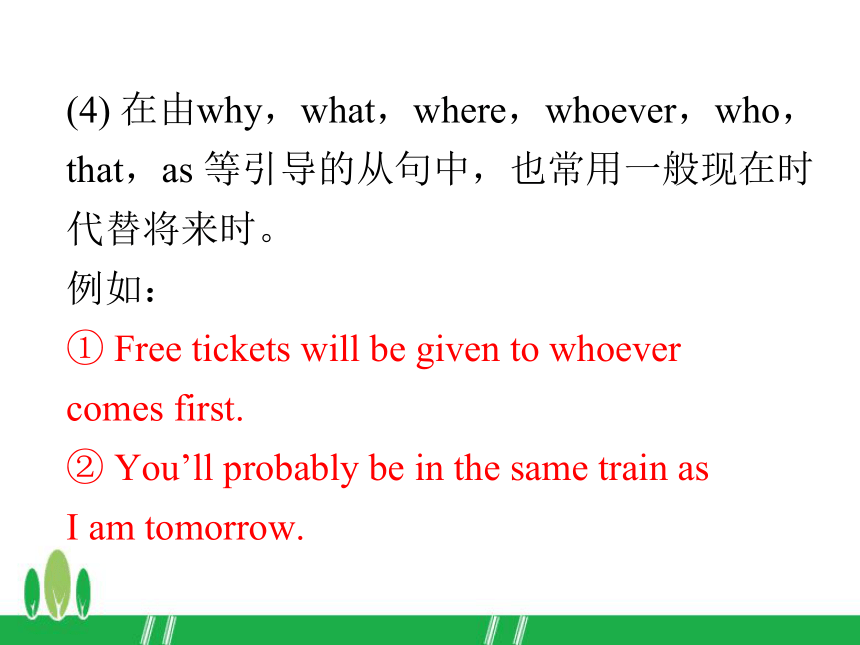


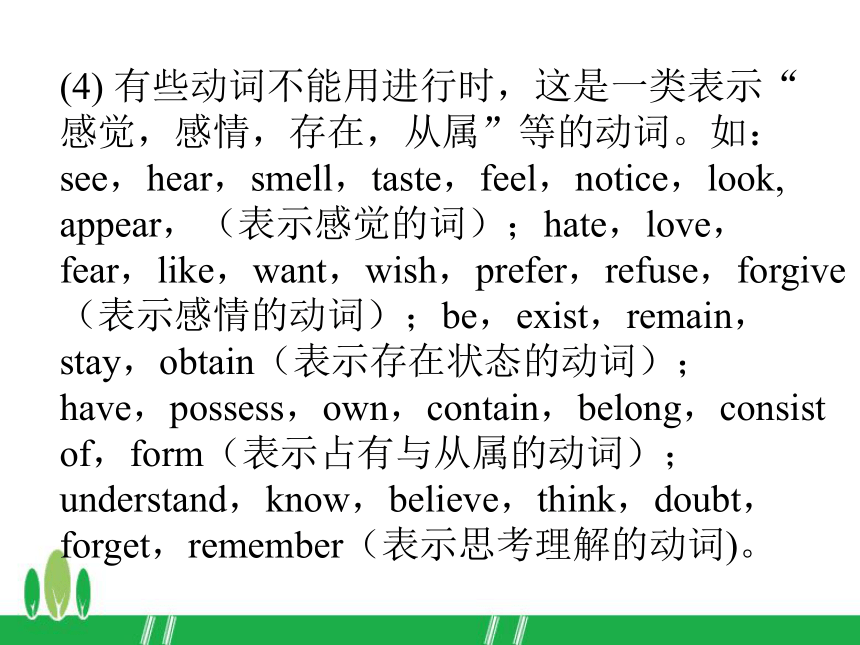

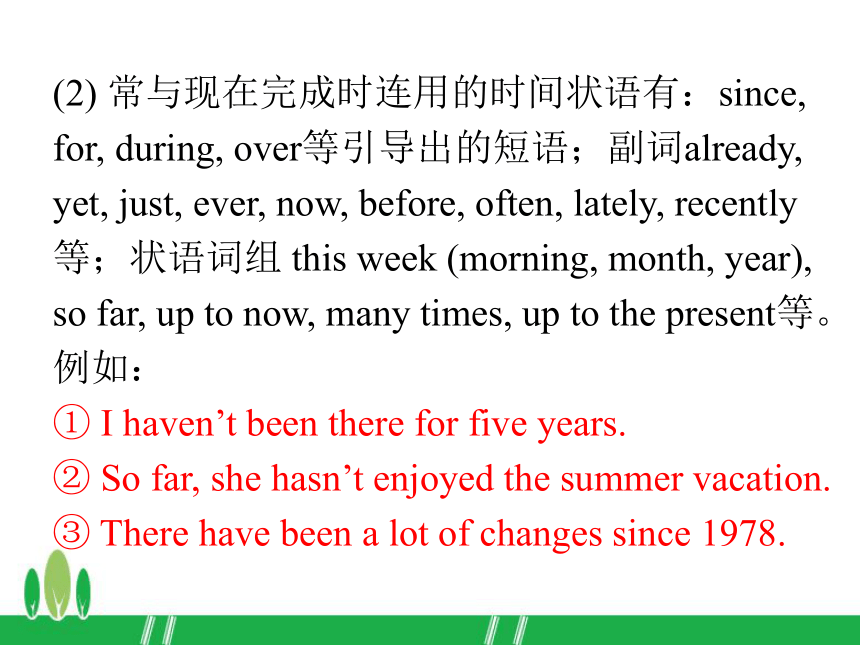
文档简介
课件31张PPT。 Module 1
British and American English
Grammar1. The British say Have you got…? while Americans
prefer Do you have…?
2. Many factors have influenced American
pronunciation.
3. Some experts believe that the two varieties are moving
closer together.
4. Some people now believe that British English will
disappear.
5. In the future, there are going to be many
“Englishes”.
6. Look! The man is filling his automobile
with gas.FEACDBMatching Do exercise 1 on page 4 and match the sentences with the correct meaning. All languages _______ over a period of time.
English _______________ very rapidly.
How many people __________ Chinese?
I ___________American English is very different from British English.
Millions of people _______ satellite TV every day.
The percentage of non-English web pages ____________.
What languages _____ people ______ in China?
What ____ you _________this year?change develop speak think watch grow studychangeis developingspeakdon’t think watchis growingdostudyarestudying 1. 一般现在时(1) 一般现在时表示没有时限的持久存在的动
作或状态或现阶段反复发生的动作或状态,
常和副词usually, often, always, sometimes,
regularly, near, occasionally, every year, every
week 等连用。例如:
① The moon moves round the earth.
② Mr. Smith travels to work by bus every
day.(2) 在由after,until,before,once,when,
even if,in case,as long as,as soon as,the
moment 以及 if,unless 等引导的时间状语从
句或条件状语从句中,通常用一般现在时代
替将来时。例如:
① I will tell him the news as soon as I see
him.
② I will not go to the countryside if it rains
tomorrow.(3) 某些表示起始的动词,可用一般现在时表
示按规定、计划或安排要发生的动作,这类动
词有:be,go,come,start,depart,arrive,
begin,leave 等。
例如:
① The plane leaves at three sharp.
② The new teachers arrive tomorrow.(4) 在由why,what,where,whoever,who,
that,as 等引导的从句中,也常用一般现在时
代替将来时。
例如:
① Free tickets will be given to whoever
comes first.
② You’ll probably be in the same train as
I am tomorrow.2. 现在进行时 (1)表示现在正在进行的动作,常与now,
right now,at the moment,for the time being,
for the present等连用。例如:
Don’t disturb her. She is reading a newspaper
now.
(2)表示现阶段经常发生的动作,常与always,
continually,forever,constantly等连用。
例如:My father is always criticizing me.(3) 表示根据计划或安排在最近要进行的事
情。具有这种语法功能的动词仅限于过渡性
动词。即表示从一个状态或位置转移到另一
个状态或位置上去的动词。常用的有: go,
come,leave,start,arrive,return等。例如:
They are leaving for Hong Kong next month.(4) 有些动词不能用进行时,这是一类表示“
感觉,感情,存在,从属”等的动词。如:
see,hear,smell,taste,feel,notice,look,
appear,(表示感觉的词);hate,love,
fear,like,want,wish,prefer,refuse,forgive
(表示感情的动词);be,exist,remain,
stay,obtain(表示存在状态的动词);
have,possess,own,contain,belong,consist
of,form(表示占有与从属的动词);
understand,know,believe,think,doubt,
forget,remember(表示思考理解的动词)。3. 现在完成时
现在完成时用来表示对目前状况仍有影响
的,刚刚完成的动作(常与yet,already,just
连用),或者过去某一时刻发生的,持续到
现在的情况(常与for,since连用)。例如:
① I have just finished my homework.
② Mary has been ill for three days.
(2) 常与现在完成时连用的时间状语有:since,
for, during, over等引导出的短语;副词already,
yet, just, ever, now, before, often, lately, recently
等;状语词组 this week (morning, month, year),
so far, up to now, many times, up to the present等。
例如:
① I haven’t been there for five years.
② So far, she hasn’t enjoyed the summer vacation.
③ There have been a lot of changes since 1978.(3) 完成时态可用在下列结构中:
This (That, It) is (was) the first (second…) time +
定语从句;This (That, It) is (was) the only (last)
+ n +定语从句;This (That, It) is (was) +形容词
最高级+ n +定语从句。如果主句的谓语动词是
一般现在时,从句的谓语动词通常用现在完成
时;如果主句谓语动词是一般过去时,从句谓
语动词通常用过去完成时。例如: e.g. ① This is one of the rarest questions
that have ever been raised at such a
meeting.
② There was a knock at the door. It was
the second time someone had interrupted
me that evening.4.一般将来时
(1) 表示将来打算进行或期待发生的动作或状
态。例如:
I shall graduate next year.
(2) 几种替代形式:
① be going to +v在口语中广泛使用,表示准
备做或将要发生的事情。例如:
I’m going to buy a house when we’ve
saved enough money.② be to +v表示计划安排要做的事,具有“必
要”的强制性意义。例如:
I am to play tennis this afternoon.
③ be about to +v表示即将发生的事情。
例如:
He was about to start.
④ be due to +v表示预先确定了的事, 必定发
生的事。例如:
The train is due to depart in ten minutes.
⑤ be on the point/verge of +v – ing 强调即将发
生的某种事态。例如:
The baby was on the point of crying when her
mother finally came home.1. English grammar has not changed much __________
the time of Shakespeare.
2. The American spelling system has existed
__________ about 20 years.
3. I have been studying English __________ I was in
primary school.
4. We have an American teacher. He has been here
__________ January.
5. CNN has been on the air __________ more than
twenty years.
6. David has worked for CNN __________ the
year 2000.since和for后跟表时间的短语sinceforsincesinceforsincefor 是介词,而since可作介词或连词;
for 后面跟表示时间段的结构
since 后面跟表示时间点的结构ConclusionPractice1.This kind of cloth ____ very long.
A. lasts B. can be lasted
C. could last D. will be lasted
2. ---Do you like the material?
--- Yes, it ____ very soft.
A. is feeling B. felt C. feels D. is felt
3. He will simply keep on asking her until
she _____.
A. will do B. does. C. had done D. would do
ACD4. --- When will you come to see me, dad?
--- I will go to see you when you ___ the
training course.
A. will have finished B. will finish
C. are finishing D. finish
5. I will telephone you as soon as I ____ there.
get B. will get
C. had got D. am going to get
6. Come and see me when ____.
You’re convenient
B. you will be convenient
C. it is convenient to you
D. it will be convenient to youDAC7.-- So how long have you been here?
-- Just a couple of days actually. I’m on a big
journey, you know. I ___ all the places of
interest here.
am visiting B. visited
C. have visited D. will have visited.A8. ---I’m going to the States?
---How long ___ you___ in the States?
are; stayed B. are; staying
C. have; stayed D. did; stay
9. I’ve won a holiday for two weeks to
Florida. I ____ my mum.
A. am taking B. have taken
C. take D. will have taken BA10. Because the shop ____, all the T- shirts
are sold at half prices.
A. has closed down B. closed down
C. is closing down D. had closed down
11. He ___ of how he can do more for the
people.
had always thought
B. is always thinking
C. has always been thought
D. thinking always
CB12. --Look at the expression of the baby.
-- He ___ cry.
be going to B. will C. has D. is going to
13. --- When did he go to America?
--- Oh, he ____ there since half a year ago.
A. went B. has been
C. has gone D. was
DC14. --- How are you today?
--- Oh, I ____ as ill as I do today for a very long time.
A. didn’t feel B. wasn’t feeling
C. don’t feel D. haven’t felt
15. This is the first time that I ____ such a mistake.
A. made B. make
C. has made D. had make
16. This was the first time that I ___ the country.
A. have been in B. has gone to
C. had been to D. had gone to DAD17. Recently China ___ its first personal robot.
A. had developed B. has developed
C. is developing D. developed
18. So far nothing ___ clear about the meeting.
A. has done B. has been done
C. has made D. has been made.
19. We ___ the bridge for over two years and
it will be half a year before it is completed.
are building B. have built
C. have been built D. have been building.BDD20. Don’t disturb her. She _______ letters all
the afternoon and has finished eight.
writes
has been writing
has written
was writing
BHomework Have a good revision of today’s
lesson and get more related exercise
to practise.Goodbye!
British and American English
Grammar1. The British say Have you got…? while Americans
prefer Do you have…?
2. Many factors have influenced American
pronunciation.
3. Some experts believe that the two varieties are moving
closer together.
4. Some people now believe that British English will
disappear.
5. In the future, there are going to be many
“Englishes”.
6. Look! The man is filling his automobile
with gas.FEACDBMatching Do exercise 1 on page 4 and match the sentences with the correct meaning. All languages _______ over a period of time.
English _______________ very rapidly.
How many people __________ Chinese?
I ___________American English is very different from British English.
Millions of people _______ satellite TV every day.
The percentage of non-English web pages ____________.
What languages _____ people ______ in China?
What ____ you _________this year?change develop speak think watch grow studychangeis developingspeakdon’t think watchis growingdostudyarestudying 1. 一般现在时(1) 一般现在时表示没有时限的持久存在的动
作或状态或现阶段反复发生的动作或状态,
常和副词usually, often, always, sometimes,
regularly, near, occasionally, every year, every
week 等连用。例如:
① The moon moves round the earth.
② Mr. Smith travels to work by bus every
day.(2) 在由after,until,before,once,when,
even if,in case,as long as,as soon as,the
moment 以及 if,unless 等引导的时间状语从
句或条件状语从句中,通常用一般现在时代
替将来时。例如:
① I will tell him the news as soon as I see
him.
② I will not go to the countryside if it rains
tomorrow.(3) 某些表示起始的动词,可用一般现在时表
示按规定、计划或安排要发生的动作,这类动
词有:be,go,come,start,depart,arrive,
begin,leave 等。
例如:
① The plane leaves at three sharp.
② The new teachers arrive tomorrow.(4) 在由why,what,where,whoever,who,
that,as 等引导的从句中,也常用一般现在时
代替将来时。
例如:
① Free tickets will be given to whoever
comes first.
② You’ll probably be in the same train as
I am tomorrow.2. 现在进行时 (1)表示现在正在进行的动作,常与now,
right now,at the moment,for the time being,
for the present等连用。例如:
Don’t disturb her. She is reading a newspaper
now.
(2)表示现阶段经常发生的动作,常与always,
continually,forever,constantly等连用。
例如:My father is always criticizing me.(3) 表示根据计划或安排在最近要进行的事
情。具有这种语法功能的动词仅限于过渡性
动词。即表示从一个状态或位置转移到另一
个状态或位置上去的动词。常用的有: go,
come,leave,start,arrive,return等。例如:
They are leaving for Hong Kong next month.(4) 有些动词不能用进行时,这是一类表示“
感觉,感情,存在,从属”等的动词。如:
see,hear,smell,taste,feel,notice,look,
appear,(表示感觉的词);hate,love,
fear,like,want,wish,prefer,refuse,forgive
(表示感情的动词);be,exist,remain,
stay,obtain(表示存在状态的动词);
have,possess,own,contain,belong,consist
of,form(表示占有与从属的动词);
understand,know,believe,think,doubt,
forget,remember(表示思考理解的动词)。3. 现在完成时
现在完成时用来表示对目前状况仍有影响
的,刚刚完成的动作(常与yet,already,just
连用),或者过去某一时刻发生的,持续到
现在的情况(常与for,since连用)。例如:
① I have just finished my homework.
② Mary has been ill for three days.
(2) 常与现在完成时连用的时间状语有:since,
for, during, over等引导出的短语;副词already,
yet, just, ever, now, before, often, lately, recently
等;状语词组 this week (morning, month, year),
so far, up to now, many times, up to the present等。
例如:
① I haven’t been there for five years.
② So far, she hasn’t enjoyed the summer vacation.
③ There have been a lot of changes since 1978.(3) 完成时态可用在下列结构中:
This (That, It) is (was) the first (second…) time +
定语从句;This (That, It) is (was) the only (last)
+ n +定语从句;This (That, It) is (was) +形容词
最高级+ n +定语从句。如果主句的谓语动词是
一般现在时,从句的谓语动词通常用现在完成
时;如果主句谓语动词是一般过去时,从句谓
语动词通常用过去完成时。例如: e.g. ① This is one of the rarest questions
that have ever been raised at such a
meeting.
② There was a knock at the door. It was
the second time someone had interrupted
me that evening.4.一般将来时
(1) 表示将来打算进行或期待发生的动作或状
态。例如:
I shall graduate next year.
(2) 几种替代形式:
① be going to +v在口语中广泛使用,表示准
备做或将要发生的事情。例如:
I’m going to buy a house when we’ve
saved enough money.② be to +v表示计划安排要做的事,具有“必
要”的强制性意义。例如:
I am to play tennis this afternoon.
③ be about to +v表示即将发生的事情。
例如:
He was about to start.
④ be due to +v表示预先确定了的事, 必定发
生的事。例如:
The train is due to depart in ten minutes.
⑤ be on the point/verge of +v – ing 强调即将发
生的某种事态。例如:
The baby was on the point of crying when her
mother finally came home.1. English grammar has not changed much __________
the time of Shakespeare.
2. The American spelling system has existed
__________ about 20 years.
3. I have been studying English __________ I was in
primary school.
4. We have an American teacher. He has been here
__________ January.
5. CNN has been on the air __________ more than
twenty years.
6. David has worked for CNN __________ the
year 2000.since和for后跟表时间的短语sinceforsincesinceforsincefor 是介词,而since可作介词或连词;
for 后面跟表示时间段的结构
since 后面跟表示时间点的结构ConclusionPractice1.This kind of cloth ____ very long.
A. lasts B. can be lasted
C. could last D. will be lasted
2. ---Do you like the material?
--- Yes, it ____ very soft.
A. is feeling B. felt C. feels D. is felt
3. He will simply keep on asking her until
she _____.
A. will do B. does. C. had done D. would do
ACD4. --- When will you come to see me, dad?
--- I will go to see you when you ___ the
training course.
A. will have finished B. will finish
C. are finishing D. finish
5. I will telephone you as soon as I ____ there.
get B. will get
C. had got D. am going to get
6. Come and see me when ____.
You’re convenient
B. you will be convenient
C. it is convenient to you
D. it will be convenient to youDAC7.-- So how long have you been here?
-- Just a couple of days actually. I’m on a big
journey, you know. I ___ all the places of
interest here.
am visiting B. visited
C. have visited D. will have visited.A8. ---I’m going to the States?
---How long ___ you___ in the States?
are; stayed B. are; staying
C. have; stayed D. did; stay
9. I’ve won a holiday for two weeks to
Florida. I ____ my mum.
A. am taking B. have taken
C. take D. will have taken BA10. Because the shop ____, all the T- shirts
are sold at half prices.
A. has closed down B. closed down
C. is closing down D. had closed down
11. He ___ of how he can do more for the
people.
had always thought
B. is always thinking
C. has always been thought
D. thinking always
CB12. --Look at the expression of the baby.
-- He ___ cry.
be going to B. will C. has D. is going to
13. --- When did he go to America?
--- Oh, he ____ there since half a year ago.
A. went B. has been
C. has gone D. was
DC14. --- How are you today?
--- Oh, I ____ as ill as I do today for a very long time.
A. didn’t feel B. wasn’t feeling
C. don’t feel D. haven’t felt
15. This is the first time that I ____ such a mistake.
A. made B. make
C. has made D. had make
16. This was the first time that I ___ the country.
A. have been in B. has gone to
C. had been to D. had gone to DAD17. Recently China ___ its first personal robot.
A. had developed B. has developed
C. is developing D. developed
18. So far nothing ___ clear about the meeting.
A. has done B. has been done
C. has made D. has been made.
19. We ___ the bridge for over two years and
it will be half a year before it is completed.
are building B. have built
C. have been built D. have been building.BDD20. Don’t disturb her. She _______ letters all
the afternoon and has finished eight.
writes
has been writing
has written
was writing
BHomework Have a good revision of today’s
lesson and get more related exercise
to practise.Goodbye!
